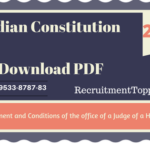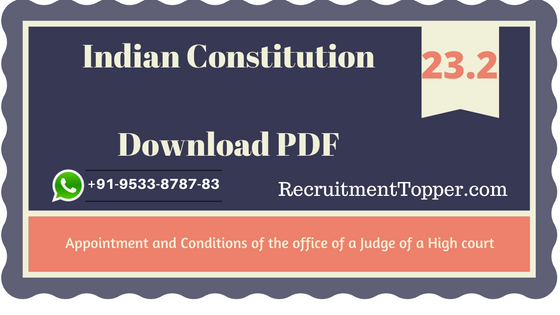Appointment and Conditions of the office of a Judge of a High Court
Every Judge of a High Court shall be appointed by the President. In making the appointment, the President shall consult the Chief Justice of India, the Governor of the State (and also the Chief Justice of that High Court in the matter of appointment of a Judge other than the Chief Justice).
Participatory Consultative Process.—A nine judge Bench of the Supreme Court has held that (1) the process of the appointment of the Judges of the High Courts is an integrated ‘participatory consultative process’ for selecting the best and most suitable persons available for appointment; and all the constitutional functionaries must perform this duty collectively with a view primarily to reach an agreed decision, sub serving the constitutional purpose, so that the occasion of primacy does not arise.
(2) Initiation of the proposal for appointment in the case of High Court must invariably be made by the Chief Justice of that High Court.
(3) In the event of conflicting opinions by the constitutional functionaries, the opinion of the judiciary ‘symbolised by the view of the Chief Justice of India’ formed by him in consultation with two senior most Judges of the Supreme Court who come from that State, would have supremacy.
(4) No appointment of any Judge of a High Court can be made unless it is in conformity with the opinion of the Chief Justice of India.
(5) In exceptional cases alone, for stated strong cogent reasons, disclosed to the Chief Justice of India, indicating that the recommended is not suitable for appointment, that the appointment recommended by the Chief Justice of India may not be made. However, if the stated reasons are not accepted by the CJI and the other Judges of the Supreme Court, consulted by him in the matter, on reiteration of the recommendation by the CJI, the appointment should be made as a healthy convention.
Subsequently, the President of India in exercise of his powers under Art. 143 made a Reference to the Supreme Court relating to the consultation between the CJI and his brother Judges in matters of appointments of the High Court Judges, but not as a review or reconsideration of the Supreme Court Advocates case [Second Judges case) above. The S.C. opined that “consultation with the CJI” implies consultation with a plurality of Judges in the formation of opinion. His sole opinion does not constitute consultation. Only a collegium comprising the CJI and two senior most Judges of the S.C., as was in the Second Judges case above, should make the recommendation. The collegium in making its decision should take into account the opinion of the CJI of the High Court concerned which “would be entitled to the greatest weight,” the views of the other Judges of the High Court who may be consulted and the views of the other Judges of the S.C. “who are conversant with the affairs of the High Court concerned.” The views of the Judges of the S.C. who were puisne Judges of the High Court or CJ., thereof, will also be obtained irrespective of the fact that the H.C. is not their parent H.C. and they were transfered there. All these views should be expressed in writing and be conveyed to the Govt, of India along with the recommendation of the collegium. The recommendations made by the CJI without complying with the norms and requirements of the consultation process, as aforestated, are not binding upon the Govt of India.
The Union of India is the ultimate authority to approve the recommendations for appointment as a judge. The view that without consultation with the collegium the opinion of CJI is not legal, can not be sustained. If the factors which render an additional judge unsuitable for appointment as a permanent judge exit, it would not only be improper but also undesirable to continue him as Additional Judge.
More Resources

